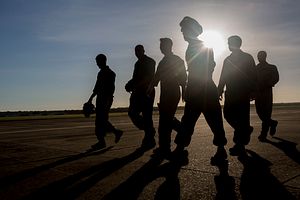North Korea’s successful test of an intercontinental ballistic missile (ICBM) indicates that the regime in Pyongyang seeks a nuclear weapons program not solely for deterrence purposes, but one with a significant offensive capability.
While attention to this capability has mostly focused the missile’s ability to reach areas of the United States such as Hawaii or Alaska, the minimum range to qualify as ICBM (5,500km) would also put the missile in reach of northern Australia. This will undoubtedly increase the concern within the Australian government about the actions of North Korea.
In April, a Pyongyang spokesperson was highly critical of Australia’s military alliance with the United States stating that “the present Government of Australia is blindly and zealously toeing the US line,” and adding that “if Australia persists in following the US’s moves to isolate and stifle North Korea … this will be a suicidal act of coming within the range of the nuclear strike of the strategic force of North Korea.”
Of course this kind of aggressive rhetoric is usually taken with a pinch of salt due to the previous limited capabilities — and the common theatrical posturing — of the North Korean regime. However, with this successful weapons test, these kind of threats will need to be treated a little more seriously by Australia’s security apparatus.
Also in April the official newspaper of the Worker’s Party of North Korea, Rodong Sinmun, made note of the presence of 1,250 U.S. troops and significant military assets in the northern Australian city of Darwin. This may elicit some concerns that the U.S military presence in the city makes Australia a target. Darwin would be within the range of an ICBM.
However, the U.S’s most important asset in Australia, the Pine Gap facility in central Australia — one the of the United States most important intelligence gathering facilities — would not be in reach of the current North Korean ICBM.
Assessing the likelihood of a nuclear strike on Australia requires contemplating whether current actions by North Korea are seen as strictly defensive measures (designed simply to preserve the regime), or aggressive measures, with the strategic hope of causing a breakdown in the alliance between the U.S and South Korea (and the ultimate reunification of Korea under Pyongyang’s leadership). A similar split in the U.S-Australia alliance may be perceived as part of this broader game of decoupling the U.S from its strategic partners in the Asia-Pacific.
In this scenario, the presence of U.S troops in Darwin could be seen as a security guarantee, rather than a threat. Any attack on Darwin would be taken by the U.S as an attack on its stationed military presence there (and therefore the U.S itself). While Australia believes it is protected by the U.S nuclear umbrella, there is no official document that specifically guarantees this, only a general understanding that this is the case. Therefore, the U.S military presence in Darwin acts as a functional insurance policy for Australia.
If the decoupling of alliances is the ultimate goal of the North Korean regime then both this tactic and President Donald Trump’s inconsistency over U.S’s regional alliances with Japan and South Korea that play into Pyongyang’s hands would be a significant threat to Australia’s interests.
China, Japan, South Korea, and the United States are Australia’s four largest trading partners, which makes stability in Northeast Asia absolutely paramount to Australia’s prosperity. Not just security stability, but economic stability as well.
If the United States attempts to use economic pressures — like limiting imports of steel — as a tool to encourage China to bring North Korea to heel, a potential tit-for-tat tariff war throughout the major regional economies would be highly detrimental to Australia. Surprisingly this kind of tactic has nevertheless gained sympathy within the Australian government.
The Australian government is currently sharing President Trump’s assertion that China has the capability (or even the desire) to prevent any further military advancement by Pyongyang. Prior to leaving Australia for the G20 summit in Hamburg, Prime Minister Malcolm Turnbull stated that “The prospect of a conflict on the Korean peninsula is unthinkable but equally, you have to consider it … and recognize that only the strongest action from China can stop this dangerous escalation by North Korea, absent military action.” Turnbull also stated that China was in the position to cut off North Korea’s power and gas as a way of coercing Pyongyang.
Turnbull should hope that continually reiterating this kind of pressure on China does not foster any resentment within Beijing. North Korea cleverly planned this weapons test in order to hijack discussions at the G20 discussions. These discussions should have focused on maintaining cooperative and open trade. By straying from this agenda the forces that will undermine regional security in Northeast Asia will be enhanced.

































